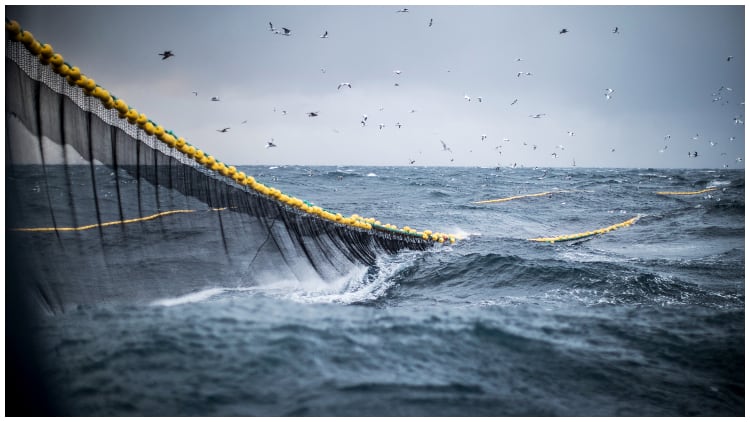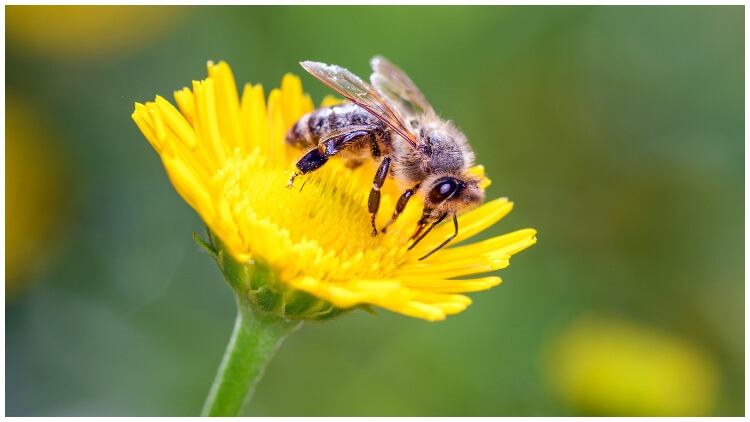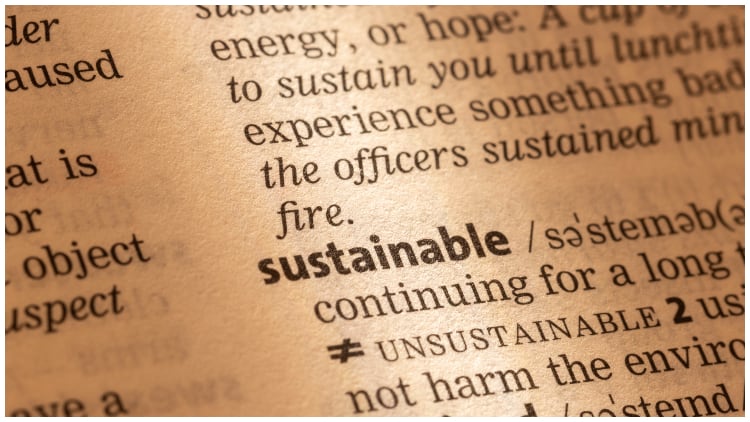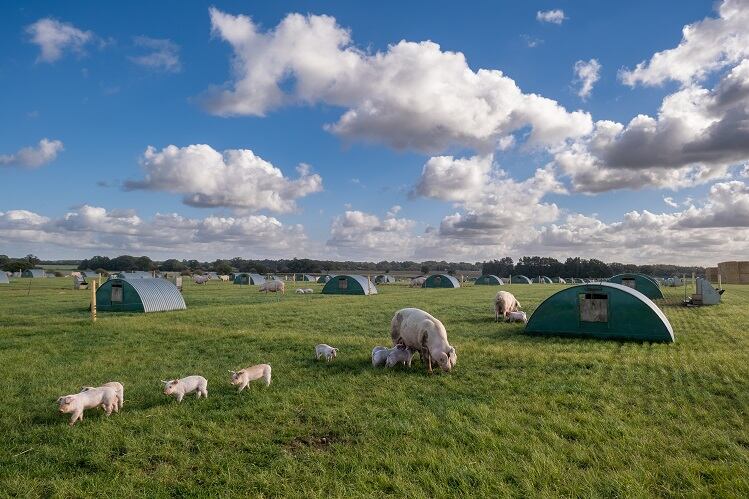If I were to ask you to define sustainability, what would your answer be? Do you think it would be the same as the person next to you? Do you think as a food industry professional it would be the same as another in a different career? The answer to that is: probably not.
Some would argue that the meaning of sustainability, which was originally used to describe the status of a resource, has transcended this definition to include other holistic factors such as ethical practices, nutrition and worker wellness.
What does sustainability actually mean?
But as the meaning of sustainability has evolved, has it become too convoluted, too confusing to manage?
What do food and drink manufacturers now need to focus upon in order to be authentically sustainable?
“Sustainability seems to have become a universal word overnight,” said Robert Edge-Partington, media and communications officer for the IFST. “To most people, it means using less plastic, driving an electric car, or eating plant-based foods. When you delve beneath the surface, it starts to get complicated.
“The language of sustainability can be impenetrable to even the sharpest minds – how are people supposed to navigate the difference between carbon neutral, climate neutral, climate positive and carbon negative?
“The mission of sustainability is really a lot simpler than all this – a fairer world for everyone who lives on Earth, a fairer world for nature, where people have their needs met.”
Sustainability and ethics
For Joshua Farinella director of compliance and quality assurance at Lund’s Fisheries, sustainability “must be viewed through a wide-angle lens”.
He explained: “We can’t just look at sustainability as making sure the product or resource isn’t over-harvested or overused. The labour force and the resources dedicated to the labour force, must also be monitored and controlled.
“A successful and sustainable supply chain/product starts with the employees. It is by creating, positively reinforcing and continuously improving an employee-centric culture that we are able to continue sustainability efforts. While the sustainability of the resource itself is generally determined by scientific research, the harvesting of that resource relies on the human element. An employee who is treated with dignity and respect is far more likely to not only perform better, but to also care more about the duties they are performing.”
Edge-Partington agrees: “A world which will have achieved sustainability should include education, gender equality, social equity, access to clean energy and much more. Health and worker rights are absolutely at the core of this. It may seem like a pipe dream to business, but this world is less out of reach than we realise. Many businesses are already making great strides in creating codes of practice for tackling issues such as modern slavery or food waste, and sustainability further enhances this.”
He points to the United Nations (UN) Sustainability Development Goals (SDG) as a useful way to consider this evolved meaning of sustainability. “This framework was introduced by the UN Framework Convention on Climate Change to help the world work towards sustainability in the run-up to 2030. It provides a useful breakdown of all the areas we need to work on as a society. Many of these can be related to health and worker rights and can form the bedrock of a sustainability framework for business.”
Illegal, unreported and unregulated fishing
Lunds is encompassing its definition of sustainability by ensuring it’s tackling one of the biggest issues in fishing – IUU (illegal, unreported and unregulated) fishing, which includes forced and trafficked labour.
“The fishing industry is a huge and ever-growing business. While most companies go about doing things the right way, there are others who look to take advantage of what is most definitely a finite resource – and they tend to use any means necessary to accomplish this.
“These ‘bad actors’ already know they’ll be fishing illegally and have no qualms about using deceptive methods to go about crewing their vessels.”

These vulnerable workers will likely find their personal documentation (passports etc.) confiscated and that the vessel does not have adequate quarters for crew, and in the worst cases, sufficient food or fresh water.
“What is already an inherently dangerous job is now even more so.”
Most legitimate fishing takes place in a country’s Exclusive Economic Zone (EEZ), which has a range of 200 nautical miles from the country’s coast. This area is monitored and regulated, with catches documented and reported. Whereas, less savoury vessels will hover just beyond this zone, using networks they’ve established to get product back to port.
“The workers that they’ve essentially scammed to crew the vessels may or may not get paid. If they do get paid, it will be an amount less than they were promised.”
Sustainability and biodiversity
For Ecotone UK’s chief executive Emma Vass, sustainability is about “creating lasting changes” to the way we produce and consume food globally. She believes that sustainability should be a key factor throughout the production process.
She offers the example of using alternative ingredients (which aren’t overconsumed plant species), looking after worker wellness, and encouraging positive practices in agricultural, transport and packaging, as well as utilising renewable energies.
“This means reimagining our current conventional food system to include creating varied diets, with organic and plant-based foods as the foundations which stray away from the standardised industrial method,” she told Food Manufacture.
“Sustainability is more than the footprint of the products people consume,” Vass added. “Sustainability is intrinsically linked to our planet’s beautiful biodiversity from plants and animals to people. Looking after the health and wellbeing of both our consumers and workers, is a key part of protecting and growing biodiversity.
“This is why sustainability should be a core consideration at each stage in the production process. It’s why we only use quality ingredients from suppliers we trust and continue to invest in our brands to bring the best possible products to market – offering more and better choice.”
As part of its sustainability drive, Ecotone has launched its ‘Food for Biodiversity’ mission, which is designed to protect, grow and care for biodiversity across all areas of its business.
“As a pioneering food company, it is our responsibility to keep innovating with sustainable products and share best practice to make a positive impact together,” Vass stated.
Michael Kyriakou, the founder of Gaia’s Farming Co., agrees that plant-based alternatives is a key part of achieving sustainability, but also sees that other aspects of achieving sustainability will help connect the pieces of the puzzle.
“Broadly speaking, sustainability, to us, requires that someone/something is not being taken advantage of. Whether that is Mother Earth or a worker,” he said.
This has led Gaia’s Farming to create a product which is made (in part) from hemp.
“Hemp is one of the most sustainable plants on Earth. Unlike other plant-based milks such as soy and rice, hemp is an extremely sustainable crop, growing quickly, requiring far less water and growing well without the use of pesticides. It’s actually carbon negative, converting more CO2 than any forest or commercial crop. So, the more hemp we grow, the greater our carbon sequestration contribution.
“Studies have shown that even when processed, hemp performs carbon sequestration and can absorb up to four times the amount of carbon than trees (per acre). It has a short growth cycle of 12-14 weeks and between crop cycles it can replenish soil with far more nutrients than it uses through phytoremediation, also removing radioactive chemicals and toxins.”
He described it as a plant with the ability to recycle. “Hemp has the potential to be zero-waste because each part of the plant can be used – whether it’s the seeds for milk, long stalk fibres for textiles or short stalk fibres for paper or biopolymers.”
But if hemp boasts so many benefits, why the need for oat in its drink? Commenting on this fusion, Kyriakou said it’s a result of how popular oats are.
“In the UK, one in three people has adopted a plant-based drink diet, with oats currently showing the highest growth in the sector,” he explained. “Using a blend of the two means that our drink still has that creamy texture that people are used to but it’s healthier for us and the planet.”
How to avoid being just a buzzword
There are many, however, that would argue against the use of alternatives, that certain plant-based products rely on lots of water or necessitate long journeys before they arrive on UK shores.
Kyriakou acknowledged this. He raised issue with the facetious use of the word ‘sustainability’, which can lead to incidences of greenwashing (making misleading environmental claims). Commenting on the word's evolution, he said that the only development is that sustainability is now “mainstream”.
“Almost detrimentally so,” he suggested. “People use it [sustainability] flippantly without really understanding the discourse of such. As long as we're as transparent as possible we should be in a better place. Sustainability is as much about the journey as it is the destination.”

Kyriakou also stated that although some alternatives do depend heavily on the aforementioned aspects, such as water and food miles, that hemp was not among them. Yet, he added that, in his opinion, “by default at the foundational level plant-based crops are superior in sustainability than animal agriculture”.
He continued: “Regardless of the miles inputted – which of course come from all areas of the supply chain, it is down to the company/operator to offset that or work to mitigate their footprint.”
Concerns over the evolution of sustainability’s definition potentially encouraging greenwashing was something that Vass recognised too.
“We know that people are becoming less engaged about sustainability as a ‘buzzword’, with so many companies laying claims which aren’t always fully evidenced, or [that] can mean different things,” she commented.
“While this makes it difficult for consumers to understand how they can make the most sustainable choice on shelf, it is the backing of trusted certifications schemes such as the Soil Association, Rainforest Alliance, Fairtrade, and B Corp that help. Our role is to keep explaining what ‘sustainability’ means to us, and how it translates into tangible actions – both in the immediate and longer-term future.”
Leo Campbell, co-founder of Modern Baker, also had strong feelings about the word’s evolution, indicating it had evolved in an unhelpful manner.
“Sustainability should mean managing the planet’s resources so we are no longer reliant on intrinsically finite stocks of anything. Since the misuse of these finite resources is also directly linked to climate change, the urgent spectre of an existential threat to life on the planet has forced us to address this issue before the actual resource has been terminally depleted – but the meaning [of sustainability] seems to have moved on unhelpfully if you’re a member of the human race, but helpfully if you’re a corporation tasked with solving these problems,” he argued.
“It’s become less about diminishing stocks of fossil fuels and more about why we shouldn’t be using them even if we could frack or mine our way to a few more decades of thoughtless habitat destruction.
“Despite this clear and present danger, industry has managed to turn the phrase into a mishmash/catch-all for their ‘ethical’ footprint and put it all in a neat box called ‘ESG’, covering all the inconvenient long-term truths in a way that allows short-term steps to stand in for genuine systemic change.”
Is nutrition a part of sustainability?
Leo offered the example of a recent food industry sustainability award scheme that insists all entries had to score highly on both sustainability and nutrition/health.
“That’s like saying an Olympic winner will be disqualified if they have a bad credit score,” he argued. “They are two very separate and incredibly important challenges, and to bundle them up by forcing a tick in both boxes at once can only lead to a weird mediocrity.
“A ‘super-smoothie’ with 10% sugar content and only 1% fibre content but in a new compostable bottle, is more likely to win a food industry innovation award than a radically healthy smoothie in last year’s bottle. Given the existential magnitude – and proximity – of each of those issues, that can’t be right at any level.
“It’s obvious to see why this conflation suits a big corporation, because it is not in their DNA to be able to fix either. So changing the goalposts allows them play offside all the time with no-one blowing a whistle – and no external VAR. Until things change.”
Although Campbell believes that a healthy population is indeed a more sustainable one, he considers it to be a more complicated than that.
Elaborating on this, he told Food Manufacture: “A healthy population is more ‘sustainable’ in one simplistic way, in that it’s able to sustain itself for longer without recourse to resource-depleting healthcare, but not in the same, functionally infinite sense as, say, hydrogen or wind.
“The two issues are huge in their own rights; any valid connections between them should be suspended until we have upstream solutions to one and/or the other.
“The DNA of a disruptive start-up has to be specific. Ours is nutrition leading to better long-term human health, via a ‘sustainable’ (in a different sense) food system. The way we’re addressing it will have knock-on effects on the wider sense of sustainability, but that’s not our focus.
“Once we separate the issues [of health/nutrition and sustainability], it will allow us to actually measure effects and celebrate successes.
“Even once we do so, current standalone health metrics still need urgent attention. Confusion with sustainability aside, their effectiveness is hampered by a) fundamentally discredited nutrition science behind HFSS; b) a need for the industry to start operating outside HFSS; and c) a need to operate at a simplistic, KS1 level so the public can, if it chooses, comprehend what they’re being politely advised to consider. They’re miles from being fit for purpose.”
For Campbell, health/nutrition and sustainability must be completely untangled.
“We need clear, distinct language boundaries so that it becomes impossible to conflate them. What will immediately become clear is that these two issues are of equal importance to society, and that nutrition is disproportionately underfunded versus sustainability, to a catastrophic degree,” he concluded.
So then…what is the meaning of sustainability?
Does anyone know what sustainability means? It seems that the definition has become so overused that one person’s explanation will differ to the next. At least though, we are recognising the issues that lay before us.
If we cannot untangle the various descriptors associated with sustainability, it is then about putting in place people who have expertise in particular areas and ensuring that they collaborate. You may well have a head of net zero, but then consider how they might want to work with a head of ethical trade or a head of nutrition and health.
As Edge-Partington said: “While there is no single solution for food businesses to become more sustainable, there are many small actions that can be taken. Even the smallest, most local actions make a difference and add up to large-scale change. Real change will come from actions across all levels of business, and from businesses receiving effective support from the government to promote sustainable transformation.”





